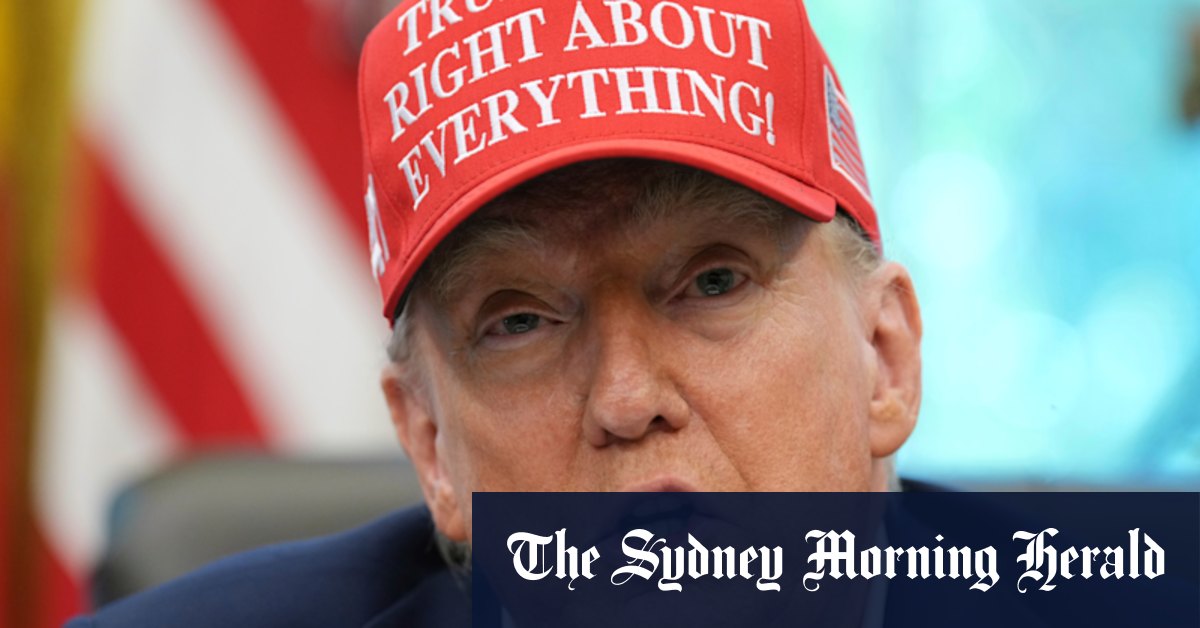The government would “continue to engage and strongly advocate for removal of the tariffs”, they said.
White House spokesman Kush Desai said Trump had acted lawfully, and “we look forward to ultimate victory on this matter”.
The ruling complicates Trump’s ambitions to upend decades of American trade policy completely on his own.
His tariffs – and the erratic way he’s rolled them out – have shaken global markets, alienated US trading partners and allies, and raised fears of higher prices and slower economic growth.
But he’s also used the levies to pressure the European Union, Japan and other countries into accepting one-sided trade deals and to bring tens of billions of dollars into the federal Treasury to help pay for the massive tax cuts he signed into law on July 4.
Loading
The government has argued that if the tariffs are struck down, it might have to refund some of the import taxes it has collected, delivering a financial blow to the Treasury.
“It would be 1929 all over again, a GREAT DEPRESSION!” Trump said in a previous social media post.
Revenue from tariffs totalled $US159 billion ($243 billion) by July, more than double what it was at the same point the year before. Indeed, the Justice Department warned in a legal filing this month that revoking the tariffs could mean “financial ruin” for the United States.
The ruling involves two sets of import taxes, both of which Trump justified by declaring a national emergency under the 1977 International Emergency Economic Powers Act.
That includes sweeping tariffs he announced April 2 – “Liberation Day”, he called it – when he imposed tariffs of up to 50 per cent – he falsely claimed they were “reciprocal” – on countries with which the US runs trade deficits and a “baseline” 10 per cent tariff on just about everyone else. Australia received the lowest rate, 10 per cent.
The national emergency underlying the tariffs, Trump said, was the long-running gap between what the US sells and what it buys from the rest of the world. The president started to levy modified tariff rates in August, but goods from countries with which the US runs a surplus also face the taxes.
It also covers the “trafficking tariffs” he announced February 1 on imports from Canada, China and Mexico. These were designed to get those countries to do more to stop what he declared a national emergency: the illegal flow of drugs and immigrants across their borders into the US.
Loading
The Constitution gives Congress the power to impose taxes, including tariffs. But over decades, lawmakers have ceded authorities to the president, and Trump has made the most of the power vacuum.
But Trump’s assertion that the International Emergency Economic Powers Act essentially gives him unlimited power to tax imports quickly drew legal challenges – at least seven cases. No president had ever used the law to justify tariffs, though the act had been used frequently to impose export restrictions and other sanctions on US adversaries such as Iran and North Korea.
In May, the US Court of International Trade in New York rejected the argument, ruling that Trump’s global tariffs “exceed any authority granted to the president” under the emergency powers law. In reaching its decision, the trade court combined two challenges – one by five businesses and one by 12 US states – into a single case.
In the case of the drug trafficking and immigration tariffs on Canada, China and Mexico, the trade court ruled that the levies did not meet the International Emergency Economic Powers Act’s requirement that they “deal with” the problem they were supposed to address.
Loading
The court challenge does not cover other Trump tariffs, including levies on foreign steel, aluminum and autos that the president imposed after Commerce Department investigations concluded that those imports were threats to US national security.
Nor does it include tariffs that Trump imposed on China in his first term – and Joe Biden kept during his presidency – after a government investigation concluded that the country used unfair practices to give their own technology firms an edge over rivals from the US and other Western nations.
Trump has alternative laws for imposing import taxes, but they would limit the speed and severity with which he could act.
AP
Get a note directly from our foreign correspondents on what’s making headlines around the world. Sign up for our weekly What in the World newsletter.

